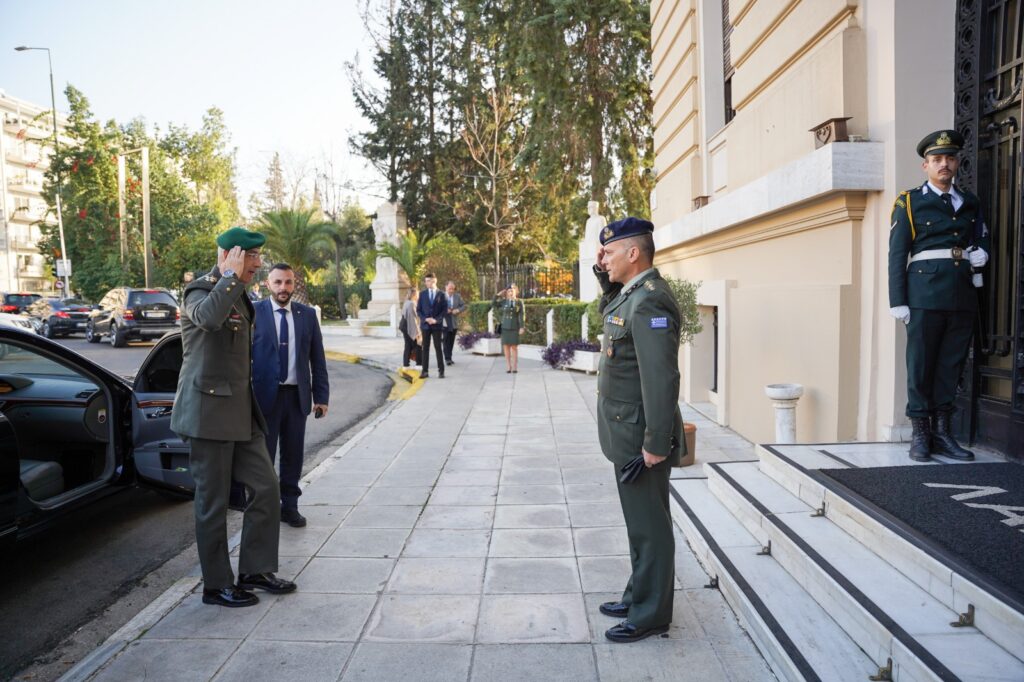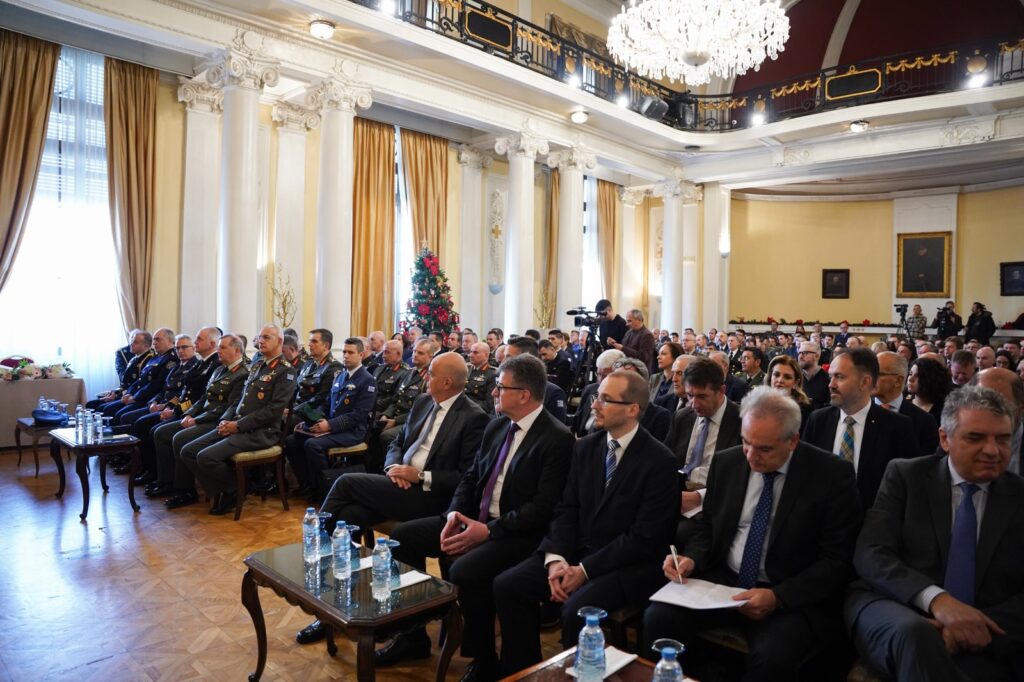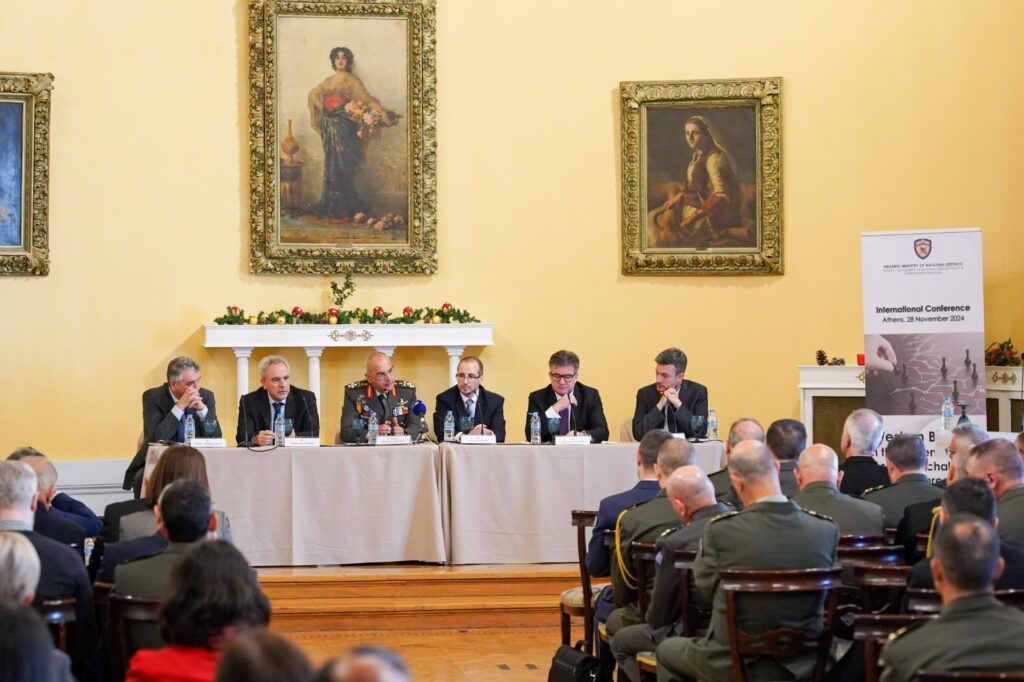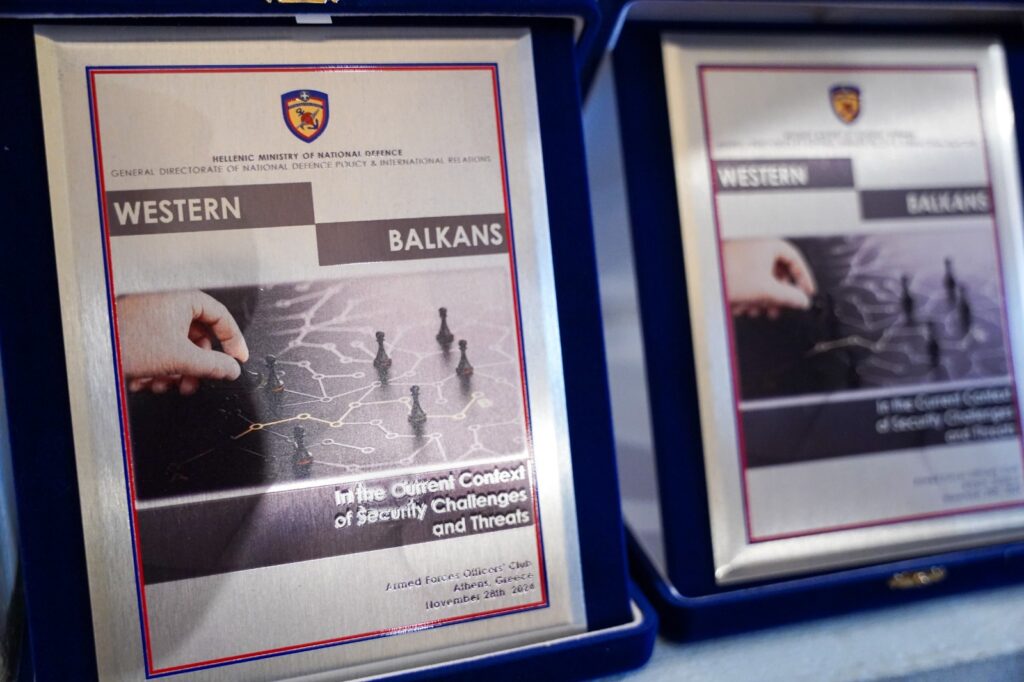Την Πέμπτη 28 Νοεμβρίου 2024 ο Αρχηγός ΓΕΕΘΑ Στρατηγός
Δημήτριος Χούπης συμμετείχε, παρουσία του Υπουργού Εθνικής Άμυνας κ.
Νικόλαου Δένδια, ως ομιλητής στην ημερίδα με θέμα «Western Balkans in the
Current Context of Security Challenges and Threats», που διοργάνωσε η
Γενική Διεύθυνση Πολιτικής Εθνικής Άμυνας και Διεθνών Σχέσεων του
Υπουργείου Εθνικής Άμυνας (ΥΠΕΘΑ/ΓΔΠΕΑΔΣ).
Σκοπός διεξαγωγής της ημερίδας ήταν η ενημέρωση και ανταλλαγή
απόψεων επί θεμάτων γεωπολιτικής, στο εγγύς αλλά και στο ευρύτερο
περιφερειακό περιβάλλον των Δυτικών Βαλκανίων, προκειμένου για την
χαρτογράφηση των σύγχρονων απειλών και προκλήσεων ασφαλείας στην
περιοχή.
Ο Αρχηγός ΓΕΕΘΑ, αφού ευχαρίστησε τους διοργανωτές, τοποθετήθηκε
επί της πρώτης θεματικής ενότητας με τίτλο «Current Trends in Security
Environment Across the Western Balkans». Κατά την ομιλία του αναφέρθηκε
στη γεωπολιτική σημασία της περιοχής, στην κατάσταση ασφαλείας και τις
υφιστάμενες προκλήσεις, καθώς επίσης και στη σημασία της συνεργασίας
μεταξύ των κρατών των Δυτικών Βαλκανίων.
Η ομιλία του κ. Αρχηγού ολοκληρώθηκε με ευχαριστίες προς τους
διοργανωτές και τους συμμετέχοντες στην ημερίδα, μεταξύ των οποίων και
διακεκριμένοι ομιλητές από την Ελλάδα και το εξωτερικό.
ΟΜΙΛΙΑ ΑΡΧΗΓΟΥ ΓΕΕΘΑ
σε Ημερίδα του ΥΠΕΘΑ/ΓΔΠΕΑΔΣ με Θέμα:
«Western Balkans in the Current Context of
Security Challenges and Threats»
It is an honour to address you today on the occasion of Conference
“Western Balkans in the Current Context of Security Challenges and
Threats” and, in particular, to be part of this panel alongside such
distinguished and esteemed fellow speakers. Let me start by stating that
geography produces history, and this phrase has over the centuries been
depicting an indisputable reality in the Balkan region.
First, allow me to thank the General Directorate of National Defence
Policy and International Relations of the Hellenic Ministry of National
Defence for the outstanding initiative to organize this conference, which
undoubtedly serves as a pivotal event for conducting a thought-provoking
dialogue on the multifaceted security challenges besetting the Western
Balkans. Diverse perspectives are invaluable to our understanding of these
pressing matters, and I look forward to being introduced thereto.
To begin with, the Western Balkan region is at a geopolitical crossroad,
with great strategic importance, attracting the interest of various global
powers and is pivotal in shaping the future landscape of the European Union.
European Union’s integration remains a primary aspiration.
Nevertheless, Russia, China and other state and non-state actors compete
for influence through economic investments and diplomatic engagements
affecting regional dynamics, particularly human and economy-level security,
using stealth, hybrid and – to a great extent – asymmetric influence
campaigns, leveraging information manipulation.
The principle of the rule of law and good governance holds immense
significance in shaping human and economy-level security in the Western
Balkans. Understanding the impact of this principle is crucial in evaluating its
effects on stability, prosperity, and the overall security landscape of the
region. Embracing and implementing effective governance practices and rule
of law principles are indispensable for ensuring a secure and prosperous
future for the Western Balkans region, which could be described as a
“patchwork” in the sense that different religions and empires have left their
mark on its history.
The importance of sustaining the EU-accession agenda (for the WB
countries) is directly related to the region’s stability and prosperity. There are
three factors that could prevent the EU-accession agenda from decline. First
and foremost, the EU itself should lead the region towards EU membership.
Secondly, the EU should keep this agenda alive against internal challenges
including political ones. Last but not least is the ability of the authoritarian
and revisionist forces to challenge the stability dominance of the EU and with
that to undermine the very essence of the cornerstones on which regional
stability depends. This is usually a love-hate relationship and in parallel,
other players leave their footprint on the region. The limits of the EU’s soft
power are often tested by Russia.
The Western Balkans region has long been characterized by complex
and often fragile inter-ethnic and political relations, creating an environment
prone to ethnic and political tensions. Understanding these tensions as an
emerging security trend in the region is essential for assessing the potential
risks and challenges they pose, and developing strategies to mitigate them.
The culture of conflict underlines the importance of a careful approach when
it comes to history and security. Some of the above factors reach the ground
of a region, locked between nostalgia for the past and uncertainty for the
future.
This region has been a hotspot for various forms of organized crime
and corruption. Understanding the evolving nature of these criminal activities
is urged by the negative effects on security. Therefore, predicting their future
trajectory is essential for devising effective strategies to combat these
corrosive practices that disturb economic growth, undermine prosperity,
erode public trust and affect safety and human and economy-level security.
Violent extremism in the Western Balkans represents a complex and
evolving challenge. Understanding current trends and potential evolutions in
this landscape is crucial for effective preventive measures and counter-
extremism strategies in the region. This requires a multi-faceted approach
that addresses socio-economic vulnerabilities, utilizes effective counter-
narratives, strengthens law enforcement capabilities, fosters regional
cooperation and promotes effective governance. Proactive and collaborative
efforts are imperative to mitigate the evolving threats and build resilient
societies in the Western Balkans. Military cooperation is a key part to
improve interoperability, promote stability, and mutual understanding.
Migration and border security are pivotal aspects, shaping the security
landscape in the Western Balkans, driven by various factors such as
geopolitical dynamics and global migration patterns. Understanding these
trends and their potential evolution is crucial for assessing their impact on
regional security. Regional cooperation and international support would be
imperative for managing migration dynamics and ensuring security.
Regional and, more specifically, military cooperation also stands as a
crucial pillar for stability and progress, profoundly impacting the region’s
security landscape. Recognizing the trends in regional cooperation and their
possible evolution is pivotal in addressing their influence on security
dynamics. In general, the security of regional cooperation depends on the
EU’s integration aspiration as well as bilateral and multilateral agreements.
Continued EU support for Western Balkans’s integration processes will
encourage and sustain regional cooperation efforts. Investing in
strengthening regional ties, resolving disputes through dialogue and
sustaining commitments to cooperation will be imperative for ensuring the
Western Balkans’ peaceful and prosperous future. It is abundantly clear that
the region needs to catch up with regard to its infrastructure, energy
efficiency – autonomy and climate targets and of course investments in
technology.
Economic challenges, encompassing demographic decline and other
socioeconomic factors, like youth unemployment, significantly influence the
security landscape in the Western Balkans. Acknowledging these trends and
their developing status is crucial in comprehending their impact on regional
security. Along with regional cooperation, international support is also crucial
in navigating and mitigating the evolving economic challenges facing the
Western Balkans. Reforms in the digital sphere should not only reduce the
divides, but also work in favor of combating corruption, improving the rule of
law, facilitating online commerce, and raising awareness over the
multilayered challenges of disinformation and, in some cases, cyber threats.
The aim is to counter existing challenges and fortify existing structure
for the years to come. The current security landscape and the discerned
trends lay the groundwork for the policy recommendations that should follow.
These recommendations, in turn, seek to shape the future for regional
security cooperation in the Western Balkans, guided by a holistic approach
and not through a process, which usually runs out of steam following the
personal and political changes. I will conclude by saying that we must
absolutely remain focused on solving all these security dilemmas, with a
crystal-clear roadmap, because hope is not a strategy.
Thank you for your attention.








